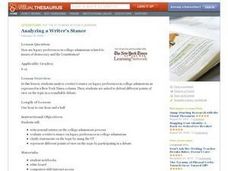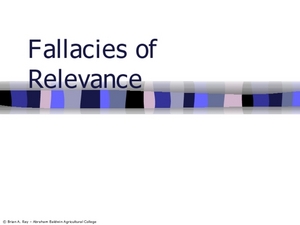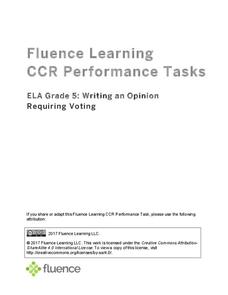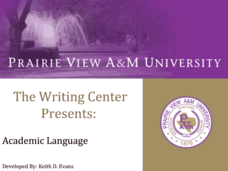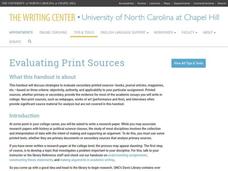Fluence Learning
Writing an Argument: Free Speech
How do you assess whether pupils have mastered certain concepts and skills? Designing a performance task that asks learners to demonstrate their skills and providing writers with a rubric that identifies these skills and provides...
Federal Reserve Bank
The Rising Cost of College: Tuition, Financial Aid, and Price Discrimination
Are average college tuition and fees really rising in the United States? Here is a fascinating take on the rising cost of college tuition and how price discrimination may explain what is often seen as an insurmountable cost for higher...
National Endowment for the Humanities
A Defense of the Electoral College
Each presidential election year, the debate about the electoral college rages. Michael C. Maibach's "A Defense of the Electoral College" offers young political scientists an opportunity to examine a reasoned argument for why the...
Fluence Learning
Writing an Argument: Innovation in America
Are American young people prepared to become tomorrow's leaders in technological innovation, or does an obsession with being cool sidetrack essential skills? That is the question freshmen and sophomores must address in a performance task...
University of North Carolina
Argument
What elements make up a successful argument? A helpful resource describes aspects of an argument such as the claim, evidence, counterargument, and audience. Perfect as an individual assignment for a flipped lesson or collaborative work,...
The New York Times
401 Prompts for Argumentative Writing
Sometimes the hardest thing about an argument essay writing assignment is coming up with a question. A four-page list of prompts includes a range of topics, from social media and smart phones to video games and sports. The list is a...
Newseum
Slanted Facts and Slippery Numbers
The Internet is known as the information superhighway, but sometimes it's hard to know when to hit the brakes on unreliable sources. Using a well-rounded lesson plan, pupils read and summarize articles about the gender pay gap and...
University of North Carolina
Music
Music is a universal pleasure, but writing about it can be a little trickier. An informative handout discusses common types of music writing assignments that one might encounter in a college-level course. Individuals read about musical...
Fluence Learning
Writing an Opinion: Is Pride Good or Bad?
Does pride really goeth before the fall, or can it be essential to one's development? Second graders read two of Aesop's fables that refer to pride in their morals, and write a short essay about whether pride is good or bad, based on...
Fluence Learning
Writing an Argument: Is Electronic Communication Helpful or Harmful?
Technology has undoubtedly improved the lives of people around the world—but has it improved communication? Seventh graders read two informative passages about the rise of texting and emailing versus in-person conversations before...
Curated OER
Analyzing a Writer's Stance
Should college admissions decisions be based on whether whose family members attended? Secondary students read and respond to a New York Times article on the issue of 'legacy preferences' in college admissions. Following class...
Turabian Teacher Collaborative
Introductions: Formulating Problem Statements
Describing a problem efficiently doesn't solve it, but a well-crafted argument can move readers to action. High schoolers focus on structuring problem statements by reading examples of strong essays and working in groups to create their...
University of North Carolina
Art History
Art analysis might help uncover some of life's most puzzling questions, such as the mystery behind Mona Lisa's smile. The handout, from the Writing for Specific Fields series, is particularly useful for those interested in pursuing art...
College Board
2005 AP® English Language and Composition Free-Response Questions
Should people only have what they need? Questions from the 2005 AP® English Language and Composition Free-Response section asks scholars to write essays evaluating the argument that those who are more fortunate should give all excess...
College Board
2000 AP® English Language and Composition Free-Response Questions
No one is perfect. George Orwell argues imperfection is preferred over sainthood. Scholars write essays describing how he expresses his argument in writing. Writers also respond to Eudora Welty's recollection of life experiences with...
College Board
2004 AP® English Language and Composition Free-Response Questions Form B
Are there unspoken rules everyone should follow? Questions from the 2004 AP® English Language and Composition Form B ask scholars to give opinions on how unspoken rules help people belong in society. Pupils also analyze a writer's...
Curated OER
Fallacies of Relevance
Review more than nine verbal and written fallacies in arguments. Many definitions and examples are given to encourage your scholars to avoid fallacies such as ad hominem and red herring. By doing this, they will have stronger speeches...
Curated OER
Family Life
What is family? Challenge your scholars to write an encompassing definition of what this word means to them. After reading "It May Be a Family Matter, But Just Try to Define Family," class members discuss the emotional issues surrounding...
Fluence Learning
Writing an Opinion Requiring Voting
Challenge writers to compose an essay detailing their stance on, and the history of, voting. Three assignments, each broken down into three parts, requires fifth graders to take notes, read and complete charts, write paragraphs, compare...
Fluence Learning
Writing About Informational Text: Beyond the Beyond—Galaxies
Everyone has a different point of view, even when it comes to the enormity of the universe. Two separate text passages explain the scope of a galaxy, prompting young readers to write an essay about each author's argument and how the...
Curated OER
Noteworthy?
Why do we have CliffsNotes? SparkNotes? Middle and high schoolers examine arguments for and against the recent influx of book notes, or study guides. They stage a debate in which they represent Advocates For or Critics Against the use of...
Curated OER
Literary Analysis: Summary vs. Analysis
What is the difference between summary writing and literary analysis? A 16-slide presentation offers some basic requirements for both types of writing and helps readers identify each based on keywords used in both types of writing....
Curated OER
Academic Language
College-level writers learn the importance of using academic language in their papers and essays. Assessing the audience is an important aspect of choosing the language with which one writes. Review these 10 slides to make sure each...
University of North Carolina
Evaluating Print Sources
Not all sources are created equal, so how do you evaluate them? Writers learn how to evaluate print sources based on elements such as audience, tone, and argument in the sixth handout of 24 in the Writing the Paper series from the...












